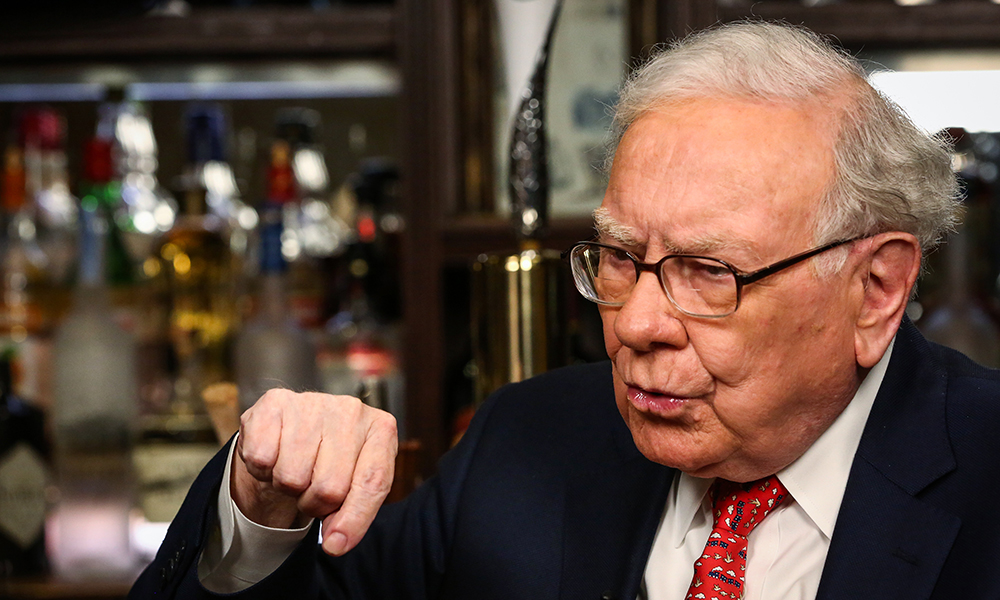
從2024年第一季度開始,,沃倫·巴菲特(Warren Buffett)大幅減持了蘋果公司(Apple)股票(蘋果公司持股占投資組合的極大比例),成為近期備受矚目的知名投資者拋售事件之一,。在過去的兩個(gè)季度里,,這位“奧馬哈先知”旗下的伯克希爾·哈撒韋公司(Berkshire Hathaway)已經(jīng)拋售了大約5.1億股的蘋果股票,減持幅度約為56%,。這次拋售的規(guī)模和突然性引起了人們的猜測(cè),,即巴菲特對(duì)蘋果公司股票的樂觀情緒在過去七年的大幅上漲之后已經(jīng)消退(巴菲特精準(zhǔn)把握并近乎完美地駕馭這輪漲勢(shì))。
值得注意的是,,蘋果仍是伯克希爾·哈撒韋公司的最大持股,占該集團(tuán)投資組合的41%,。在5月份的年會(huì)上,,巴菲特對(duì)蘋果的贊賞之情似乎并未消減。他宣稱,,他長(zhǎng)期持有的兩項(xiàng)重要投資,,即可口可樂(Coca-Cola)和美國(guó)運(yùn)通(American Express)都是“出色”的企業(yè),但他稱贊蘋果是“更為卓越的一家”,。
巴菲特并未闡明他為何大幅減持蘋果股份,,我們也不清楚他今后是否會(huì)繼續(xù)持有這家全球最具價(jià)值企業(yè)的巨額股份。但顯而易見的是,,總體而言,,在當(dāng)前高價(jià)的市場(chǎng)環(huán)境中,他采取了更為保守的立場(chǎng),。伯克希爾·哈撒韋公司在2024年上半年出售了900億美元的股票,,其中出售蘋果股票所得占了絕大部分收益。
這次減持使伯克希爾·哈撒韋公司持有的現(xiàn)金從第一季度末的1890億美元的記錄增加至2780億美元,。正如其?10-Q季度報(bào)表中披露的那樣,,該公司在7月份出售了約40億美元的美國(guó)銀行(Bank of America)股票,,進(jìn)一步擴(kuò)充了資金儲(chǔ)備。近年來,,美國(guó)銀行是其第二大持股,,與蘋果一樣,這是巴菲特低價(jià)買入且被證明獲利極為豐厚的投資,。巴菲特現(xiàn)在積累了大量額外現(xiàn)金,,用于投資那些看起來像多年前的蘋果或美國(guó)銀行那樣誘人的低價(jià)股。
在“高價(jià)拋售”的案例中,,很難有能超越巴菲特出售蘋果股票這一操作的,。通過研究這家?guī)毂鹊僦Z巨頭(蘋果公司所在地)的利潤(rùn)和估值數(shù)據(jù)軌跡,顯然可見,,當(dāng)巴菲特買入這些股票時(shí),,它們堪稱“便宜股”(市盈率為16),而當(dāng)他開始大規(guī)模獲利套現(xiàn)之時(shí),,其股價(jià)已攀升至高位(市盈率為32),,存在風(fēng)險(xiǎn)。蘋果的股價(jià)已經(jīng)達(dá)到了令人眩暈的高峰,,以至于當(dāng)前的股東,,或者現(xiàn)在買入的個(gè)人和基金,在未來數(shù)年獲得兩位數(shù)回報(bào)的機(jī)會(huì)微乎其微,。而且目前超高的估值意味著,,與比如疫情爆發(fā)前相比,如今出現(xiàn)大幅回調(diào)的可能性要大得多,,當(dāng)時(shí)蘋果股價(jià)僅為當(dāng)前的三分之一,。
不過有趣的是,巴菲特錯(cuò)過了蘋果股票的“最高點(diǎn)”,。在第二季度結(jié)束時(shí),,蘋果股價(jià)為211美元,這也是伯克希爾·哈撒韋公司拋售期的收盤價(jià),,隨后在7月16日上漲12%,,達(dá)到創(chuàng)紀(jì)錄的235美元。此后,,蘋果公司就陷入了攪動(dòng)“美股七巨頭”的漩渦,,截至8月8日,股價(jià)又回到了本季度開始時(shí)的211美元,。伯克希爾·哈撒韋公司三天前拋售的消息是蘋果公司股價(jià)下跌的主要原因,。
但這家美國(guó)的領(lǐng)軍企業(yè)并非因業(yè)績(jī)欠佳而受損,而是受累于市場(chǎng)過熱的預(yù)期和過度的熱情,。巴菲特在2016年就發(fā)現(xiàn),,當(dāng)時(shí)對(duì)蘋果的前景預(yù)期過于悲觀,,因而做出了其職業(yè)生涯中的一次重大押注。如果蘋果公司的粉絲們對(duì)該公司的期望過高,,那么收獲驚人的收益,,并減輕損失無疑是明智之舉。(財(cái)富中文網(wǎng))
譯者:中慧言-王芳
從2024年第一季度開始,,沃倫·巴菲特(Warren Buffett)大幅減持了蘋果公司(Apple)股票(蘋果公司持股占投資組合的極大比例),,成為近期備受矚目的知名投資者拋售事件之一。在過去的兩個(gè)季度里,,這位“奧馬哈先知”旗下的伯克希爾·哈撒韋公司(Berkshire Hathaway)已經(jīng)拋售了大約5.1億股的蘋果股票,,減持幅度約為56%。這次拋售的規(guī)模和突然性引起了人們的猜測(cè),,即巴菲特對(duì)蘋果公司股票的樂觀情緒在過去七年的大幅上漲之后已經(jīng)消退(巴菲特精準(zhǔn)把握并近乎完美地駕馭這輪漲勢(shì)),。
值得注意的是,蘋果仍是伯克希爾·哈撒韋公司的最大持股,,占該集團(tuán)投資組合的41%,。在5月份的年會(huì)上,巴菲特對(duì)蘋果的贊賞之情似乎并未消減,。他宣稱,,他長(zhǎng)期持有的兩項(xiàng)重要投資,即可口可樂(Coca-Cola)和美國(guó)運(yùn)通(American Express)都是“出色”的企業(yè),,但他稱贊蘋果是“更為卓越的一家”,。
巴菲特并未闡明他為何大幅減持蘋果股份,我們也不清楚他今后是否會(huì)繼續(xù)持有這家全球最具價(jià)值企業(yè)的巨額股份,。但顯而易見的是,,總體而言,在當(dāng)前高價(jià)的市場(chǎng)環(huán)境中,,他采取了更為保守的立場(chǎng)。伯克希爾·哈撒韋公司在2024年上半年出售了900億美元的股票,,其中出售蘋果股票所得占了絕大部分收益,。
這次減持使伯克希爾·哈撒韋公司持有的現(xiàn)金從第一季度末的1890億美元的記錄增加至2780億美元。正如其?10-Q季度報(bào)表中披露的那樣,,該公司在7月份出售了約40億美元的美國(guó)銀行(Bank of America)股票,,進(jìn)一步擴(kuò)充了資金儲(chǔ)備。近年來,,美國(guó)銀行是其第二大持股,,與蘋果一樣,這是巴菲特低價(jià)買入且被證明獲利極為豐厚的投資,。巴菲特現(xiàn)在積累了大量額外現(xiàn)金,,用于投資那些看起來像多年前的蘋果或美國(guó)銀行那樣誘人的低價(jià)股,。
在“高價(jià)拋售”的案例中,很難有能超越巴菲特出售蘋果股票這一操作的,。通過研究這家?guī)毂鹊僦Z巨頭(蘋果公司所在地)的利潤(rùn)和估值數(shù)據(jù)軌跡,,顯然可見,當(dāng)巴菲特買入這些股票時(shí),,它們堪稱“便宜股”(市盈率為16),,而當(dāng)他開始大規(guī)模獲利套現(xiàn)之時(shí),其股價(jià)已攀升至高位(市盈率為32),,存在風(fēng)險(xiǎn),。蘋果的股價(jià)已經(jīng)達(dá)到了令人眩暈的高峰,以至于當(dāng)前的股東,,或者現(xiàn)在買入的個(gè)人和基金,,在未來數(shù)年獲得兩位數(shù)回報(bào)的機(jī)會(huì)微乎其微。而且目前超高的估值意味著,,與比如疫情爆發(fā)前相比,,如今出現(xiàn)大幅回調(diào)的可能性要大得多,當(dāng)時(shí)蘋果股價(jià)僅為當(dāng)前的三分之一,。
不過有趣的是,,巴菲特錯(cuò)過了蘋果股票的“最高點(diǎn)”。在第二季度結(jié)束時(shí),,蘋果股價(jià)為211美元,,這也是伯克希爾·哈撒韋公司拋售期的收盤價(jià),隨后在7月16日上漲12%,,達(dá)到創(chuàng)紀(jì)錄的235美元,。此后,蘋果公司就陷入了攪動(dòng)“美股七巨頭”的漩渦,,截至8月8日,,股價(jià)又回到了本季度開始時(shí)的211美元。伯克希爾·哈撒韋公司三天前拋售的消息是蘋果公司股價(jià)下跌的主要原因,。
但這家美國(guó)的領(lǐng)軍企業(yè)并非因業(yè)績(jī)欠佳而受損,,而是受累于市場(chǎng)過熱的預(yù)期和過度的熱情。巴菲特在2016年就發(fā)現(xiàn),,當(dāng)時(shí)對(duì)蘋果的前景預(yù)期過于悲觀,,因而做出了其職業(yè)生涯中的一次重大押注。如果蘋果公司的粉絲們對(duì)該公司的期望過高,,那么收獲驚人的收益,,并減輕損失無疑是明智之舉。(財(cái)富中文網(wǎng))
譯者:中慧言-王芳
Starting in Q1 of 2024, Warren Buffett epically downsized his immense holdings of Apple stock in one of the best-publicized selloffs by any famous investor in recent memory. In the past two quarters, the Oracle of Omaha’s Berkshire Hathaway has sold roughly 510 million of the iPhone-maker’s shares, lightening its holdings by around 56%. The size and suddenness of the exit stirred speculation that Buffett’s optimism for Apple’s stock had faded following the fantastic run over the past seven years—a surge that Buffett timed and rode to near-perfection.
It’s important to note that Apple remains Berkshire’s biggest equity holding, comprising 41% of the conglomerate’s portfolio. At the annual meeting in May, Buffett’s admiration for Apple appeared undimmed. He declared that two of his long-time prized investments, Coca-Cola and American Express, were “wonderful” businesses, but that lauded Apple as “an even better one.”
Buffett isn’t saying why he shed such a large portion of his Apple stake, and we simply don’t we don’t know whether, going forward, he’ll maintain a giant position in what’s still the world’s most valuable enterprise. What’s clear is that overall, he’s taking a far more defensive position in a pricey market. Berkshire sold $90 billion in stocks in the first half of 2024, the Apple dump accounting for the vast bulk of the proceeds.
That downshift raised Berkshire’s cash holdings from the previous record of $189 billion at the close of Q1, to $278 billion. As disclosed in its 10Q, Berkshire further swelled its war chest in July by selling around $4 billion in shares of Bank of America, in recent years its second largest holding, and a stock that like Apple, Buffett bought on the cheap that’s proven a fabulously profitable bet. Buffett’s now amassed new loads of extra cash for channeling into beaten-down choices that look as enticing as Apple or Bank of America did years ago.
It’s hard to find a better case of “selling high” than Buffett’s Apple gambit. Examining the trajectory of colossus of Cupertino’s profit and valuation numbers, it’s clear that the shares have run from a screaming bargain (PE of 16) when Buffett bought them to dangerously expensive (PE of 32) by the time he began taking profits in a big way. Apple’s stock price has reached such a dizzying summit that the current shareholders, or folks and funds who buy now, stand little chance of reaping double-digit returns in the years ahead. And the currently super-elevated valuation means that a major correction is far more likely now than, say, just before the pandemic’s outbreak, when Apple fetched one-third today’s price.
However it’s interesting that Buffett missed the “top tick” on Apple shares. They ended Q2 at $211—the close of Berkshire’s selling period—before ramping 12% to a record $235 on July 16. Since then, Apple’s been caught in the maelstrom that’s roiling the Magnificent Seven, a battering that as of August 8, sent shares back to $211 where it started the quarter. News of the Berkshire unloading three days earlier was a big contributor to Apple’s fall.
But American champion’s the victim not of poor performance, but overheated expectations and excessive enthusiasm from the markets. Buffett saw in 2016 that the outlook on Apple was far too dour, and made one of the great wagers of his career. It made eminent sense to harvest much of those fabulous gains, and soften the hit if as is likely, Apple’s fans are expecting far, far too much.






